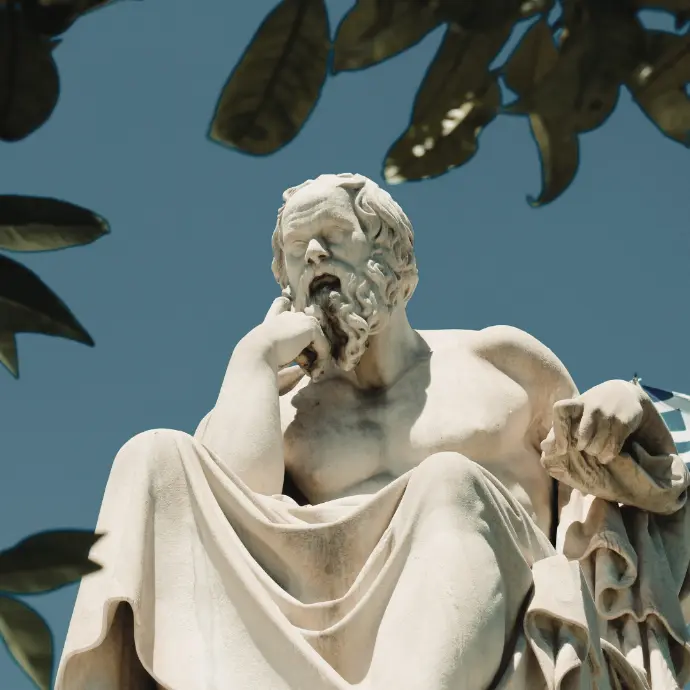“True wisdom comes to each of us when we realize how little we understand about life, ourselves, and the world around us”
Socrates
Socratic Questions: Leadership Dialogue
The ancient Greeks knew something profound about this power. Socrates, that barefoot philosopher wandering the dusty streets of Athens wasn't just creating philosophical concepts. He was crafting a revolutionary way of being with others that echoes through the corridors of time into our modern boardrooms and leadership conversations.
What if the most powerful tool in your leadership toolkit isn't having all the answers, but instead, asking the questions that matter?

The Quiet Revolution of Inquiry
Socrates never wrote a leadership manual. He never stepped foot in a corporate office. Yet his approach, this dance of questions that invites people to examine their own thinking, became the foundation of Western thought and, interestingly, modern approaches to transformation.
When we sit in the coaching space together, what are we doing if not engaging in this ancient tradition? We are creating a container where your thoughts, those constant companions that shape your reality more than any external circumstance, can be gently held up to the light. The magic happens in that space between question and answer. In that pause where possibility lives.
The Maps We Navigate By
We move through our leadership landscape reading maps that were drawn long ago, assessments about our colleagues, interpretations of challenges, beliefs about what's possible or impossible. These maps feel so real, so objective, don't they? As if everyone must surely see the terrain exactly as we do.
But here is the vulnerable truth I have learned in my own journey and witnessed in countless leaders: our maps are deeply personal creations. They bear the fingerprints of our unique experiences, the cultural waters we have swum in, the generational patterns we have inherited, the wounds and victories that have shaped us.
When was the last time you questioned your map rather than the territory?

The Grounding Practice
Here is where Socrates' wisdom becomes intensely practical. When you find yourself caught in a challenging leadership moment, perhaps friction with a team member or a project that's stirring unexpected emotions, try this grounding practice:
- Notice the assessment: What story am I telling myself about what's happening?
- Clarify your standards: What expectations or values am I measuring against?
- Gather supporting evidence: What facts (not interpretations) support my view?
- Seek contradicting evidence: What facts might point to a different meaning?
- Ground your perspective: How might I hold this assessment more lightly now?
This isn't about dismissing your intuition, that wisdom has its place. It is about recognizing that our unexamined assessments often carry unnecessary emotional weight that clouds our leadership presence.
Walking Alongside: A Leadership Story
Let me share about Elena, a talented CTO I worked with who was struggling with a senior developer on her team. In her words, "He is resistant to every new initiative I propose." When we explored this through Socratic dialogue, something beautiful unfolded:
What standards are you using to assess 'resistance'?
"I expect enthusiasm and immediate engagement with new ideas."
What evidence supports your view that he's resistant?
"He asks a lot of critical questions in meetings. He doesn't immediately volunteer for new projects."
What might contradict this assessment?
After reflection: "Well, once he commits to something, he delivers exceptional work. And his questions, while challenging, have actually saved us from several potential missteps."
Through this gentle excavation, Elena realized she had been interpreting thoroughness as resistance. Her developer wasn't opposing her vision, he was applying his natural thoughtfulness to strengthen it. The energy shift was palpable. Instead of fighting an imagined battle, Elena could now channel her leadership toward creating space for different thinking styles that ultimately strengthened her team's outcomes.
The River and the Rock: Michael's Journey
I remember sitting with Michael, a newly promoted CFO struggling with what he called "analysis paralysis" in strategic decision-making. The weight of responsibility felt crushing. "I used to be decisive," he confessed, eyes fixed on the rain-streaked window of our coaching space. "Now every decision feels like I am standing at a precipice." Instead of offering solutions, we turned to Socratic inquiry:
What's beneath your hesitation?
"Fear of making the wrong call. The stakes feel so much higher now."
What evidence do you have that your judgment is flawed?
Long pause. "Nothing concrete. Just this nagging sense that I am missing something."
When have you trusted your judgment and it served you well?
He smiled slowly, recounting three major successes in his career.
What would happen if you approached decisions not as final verdicts but as experiments?
That question landed like a stone breaking the surface of still water. The ripples were immediate. "I would be free to learn and adjust," he said, his posture visibly shifting.
Michael later described this moment as "remembering how to trust the river rather than fighting against the current." His assessment of himself as "indecisive" had become a self-fulfilling prophecy that the dialogue helped dissolve.
The Unexpected Mirror: Sarah's Leadership Edge
Then there was Sarah, a regional director whose team described her as "intimidating" in a 360 review. She was genuinely baffled, in her mind, she was simply being direct and efficient.
Our Socratic exploration revealed something fascinating:
What does 'efficient communication' look like to you?
"Getting to the point. No unnecessary pleasantries when we have work to do."
What might your team be experiencing when you communicate this way?
"They should feel respected that I don't waste their time."
What evidence suggests they might experience it differently?
She paused. "The feedback. Their hesitation to speak up in meetings."
What happens for you when someone takes time to personally connect before discussing work matters?
"Honestly? It feels inefficient. But..." her voice softened, "it also feels human."
This dialogue helped Sarah recognize that her assessment of "efficient communication" carried cultural and personality imprints that weren't universal. What felt respectful to her was reading as dismissive to others. Not because either was wrong, but because they were navigating by different maps. Sarah began experimenting with brief moments of connection, and reported that meetings became not just more pleasant but actually more productive as psychological safety increased.
The Question That Remains
Why does this matter so deeply? Because when we operate from ungrounded assessments, those stories we have never questioned, we are not truly leading from presence. We are leading from ghosts of interpretations that may have little connection to what's actually unfolding before us.
The questions we ask create the path we walk. The quality of our leadership emerges not from having all the answers, but from cultivating the courage to sit with the questions, especially those that might reshape our understanding of ourselves and others.
- What unexamined assessments might be shaping your leadership landscape today?
- What question, if you dared to ask it, might transform how you show up tomorrow?
- When has a powerful question shifted your leadership perspective?
What is Socratic dialogue?
Socratic dialogue is a form of dialogue, which encourages a group to question and reach consensus in answering a universal question. By using personal experiences in the inquiry process, this type of dialogue is a cooperative attempt to reach for the universal from the particular.
Socratic dialogue is neither a debate nor a competition. The group, as a whole, takes on the challenge of finding a concluding answer all participants can agree upon. Cooperative reflection and the search for consensus form the backbone of the Socratic dialogue.
What 3 questions did Socrates ask?
Socrates thought that a person must ask themselves the following questions before they say anything:
- “Am I sure that what I am going to say is true?”
- “Is what I'm going to say a good thing?”
- “Do I really need to say it and is it useful?”
What are the 4 major categories of Socratic dialogue?
The 4 major categories of Socratic dialogue are:
- Clarification of the thought.
- Critical examination of the thought.
- Exploration of the origin or source of the statement.
- Examination of the implications and consequences of the statement.
What are the 6 types of Socratic questions according to R.W. Paul?
According to R.W. Paul the 6 types of Socratic questions are:
- Questions for clarification: Why do you say that?...
- Questions that probe assumptions:…
- Questions that probe reasons and evidence:…
- Questions about Viewpoints and Perspectives:…
- Questions that probe implications and consequences:…
- Questions about the question:…
Moving forward together.
When leadership's complexity leaves you searching for deeper wisdom rather than quick fixes, perhaps it is time we walk the Athenian path together? Your leadership challenges deserve conversations that transcends the ordinary, where powerful questions illuminate what has remained hidden. If you are curious about how Socratic dialogue might transform your leadership presence, let's connect. The ancient wisdom awaits our modern conversation, and your unique leadership journey deserves nothing less than timeless insight brought to life through dialogue.
I am a Master Certified Coach with the International Coaching Federation, working with leaders and executives to discover their authentic leadership presence across generational, cultural, and organizational boundaries.
Note: all names and identifying details in this blog have been changed to protect client confidentiality in accordance with the ICF Code of Ethics.

book a call